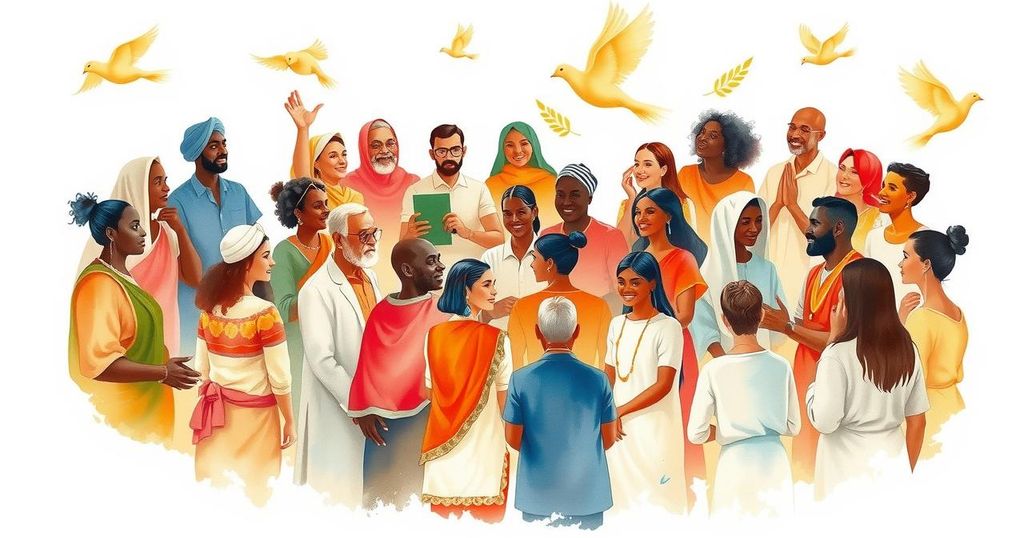Uruguay is set to hold a general election on October 29, 2024, featuring candidates Álvaro Delgado from the National Party and Yamandú Orsi from the Frente Amplio coalition. Both candidates represent centrist policies in a politically stable environment. Key issues include child poverty and security, while a significant constitutional referendum on the social security system will also be decided. Voter turnout is anticipated to be exceptionally high, reflecting the nation’s strong democratic participation.
On October 29, 2024, Uruguay will engage in a general election that underscores the stability inherent in its political environment, setting it apart from the political turbulence faced by neighboring South American nations. This election offers voters in the nation of 3.4 million the choice between Álvaro Delgado of the ruling National Party and Yamandú Orsi from the leftist Frente Amplio coalition. Both candidates share a centrist stance, reflecting a consensus on several important issues, including economic policy and social welfare. Candidates are addressing critical issues such as child poverty and security, with the latter being heightened in public discourse due to rising crime rates, despite Uruguay’s status as one of the relatively safer countries in the region. Political analyst Juan Cruz Díaz noted, “In a way, Uruguay has been boring, but boring in this sense is very good,” highlighting the country’s preference for stability amidst the political upheaval seen in nearby nations. Delgado, 55, who served as the chief of staff to current President Luis Lacalle Pou, enjoys a favorable approval rating for a government that has presided over economic growth and maintained one of the highest rates of electoral participation in the world. Orsi, 57, aims to return the Frente Amplio to power after its 15-year reign was ended in 2019. While recent polls indicate Orsi may need a runoff election to secure victory, his campaign is invigorated by the support of former President José Mujica, who is credited with steering Uruguay towards progressive reforms. Additionally, this election includes not only the presidential vote but also the selection of a new vice president and parliamentary figures. Concurrent with the elections, a contentious constitutional referendum will be conducted regarding significant changes to Uruguay’s social security system, a matter both candidates have opposed. The electorate is thus tasked with making decisions that could have profound impacts not only on their governance but also on their social structure. With voter turnout historically high, the decision to participate in these crucial elections may reflect a continued commitment to robust democratic practices in Uruguay, a stable democracy often lauded for its maturity in governance.
Uruguay, often regarded as one of the strongest democracies in Latin America, is preparing for a critical general election that encapsulates the political culture of stability and consensus. As the country approaches this electoral juncture, its political landscape has been primarily shaped by the moderate policies of the two leading parties—the ruling National Party and the opposition Frente Amplio. With a significant focus on addressing pressing social issues such as poverty and security, voters are guided by the need for effective governance rather than extreme political change, a contrast to the political climates found in neighboring countries. The current president, Luis Lacalle Pou, who is ineligible for re-election due to term limits, has seen his administration maintain a high approval rating. Therefore, candidates find themselves in a nuanced political scenario, where continuity is as important as innovation. The outcomes of this election could significantly influence Uruguay’s approach to various domestic and social policies, making it an essential moment for the nation’s robust electoral tradition.
The upcoming election in Uruguay represents a pivotal moment for the country, as voters face a choice between two centrist candidates amidst a backdrop of political stability and consensus on pressing social issues. Both Álvaro Delgado and Yamandú Orsi offer voters distinct yet moderate approaches to governance, rooted in a desire for continuity and progressive change respectively. With a high degree of voter engagement expected, the outcomes of this election will not only shape the country’s political trajectory but may also pose implications for its social welfare policies, especially in light of the concurrent constitutional referendum.
Original Source: apnews.com




